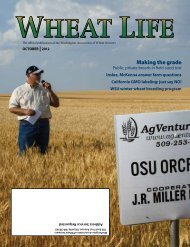Download - Wheat Life
Download - Wheat Life
Download - Wheat Life
Create successful ePaper yourself
Turn your PDF publications into a flip-book with our unique Google optimized e-Paper software.
WL<br />
WGC REPORTS<br />
Belt tightening at FSA farmers<br />
WASHINGTON GRAIN COMMISSION<br />
Patience is a virtue the State Executive Director of<br />
Washington State’s Farm Service Agency (FSA) is asking<br />
wheat farmers to practice in 2012.<br />
Cutbacks at the Washington State FSA due to a declining<br />
administrative/operational budget will necessitate<br />
growers planning further ahead and paying for some<br />
of the materials previously supplied by the agency. Due<br />
to a program of incentivizing retirement, it is also likely<br />
that farmers who have worked with specific staff in the<br />
past will no longer see those people<br />
behind county office counters. Not<br />
only that, those positions will probably<br />
remain vacant for now.<br />
The number of permanent, fulltime<br />
employees at the state FSA will<br />
decline from 130 to 118 by September<br />
2012. Judy Olson, who serves as state<br />
executive director and also operates<br />
a wheat farm with her husband,<br />
Rich, expects staffing reductions will<br />
all be achieved through retirement.<br />
Meanwhile, funding for temporary<br />
employees who are brought in to<br />
county offices to help during busy<br />
sign-up periods has been eliminated,<br />
and no overtime has been authorized in more than a<br />
year.<br />
Olson has been making the rounds of agricultural<br />
organizations to let them know what to expect, but even<br />
that is a problem. The state agency’s travel budget has<br />
been cut by more than 50 percent, and there is no money<br />
for per diem, which means overnight travel is out. Olson<br />
made it clear, however, that funding is still available to<br />
make spot checks of farmers’ field or to measure grain<br />
bins to ensure compliance under the programs the<br />
agency administers.<br />
With belt tightening extending to items like paper,<br />
printer ink cartridges and postage, farmers and their<br />
landlords will no longer receive printed newsletters.<br />
Monthly electronic newsletters will replace them and<br />
will be available on the Washington State FSA website<br />
at www.fsa.usda.gov/wa. For those individuals without<br />
high speed internet, Olson said various ideas are being<br />
considered to reach them, including leaving a few printed<br />
newsletters at county office counters or at locations<br />
where farmers gather. Individual letters will continue to<br />
be sent, but not bulk mailings.<br />
The cutbacks are extending even to the materials<br />
farmers have come to expect over the years. Olson said<br />
farmers will be limited to one set of maps and one set of<br />
documentation. If they need additional copies for landlords,<br />
they will either have to make copies themselves or<br />
pay the FSA to do it. It will be possible for county offices<br />
to download the information onto thumb drives or disks<br />
for farmers, but Olson noted that such storage devices<br />
must come to the offices in new, unopened packaging<br />
due to security concerns.<br />
The operational cutbacks are part of a national mood<br />
aimed at making government smaller<br />
by reducing federal agency funding<br />
while attempting to balance the<br />
budget. This national debate sets the<br />
scene for what members of Congress<br />
submit regarding annual appropriations<br />
for all federal agencies, Olson<br />
said. In Washington, the state FSA<br />
cuts amount to about 10 percent from<br />
the Fiscal Year 2011 funding level.<br />
These administrative/operational<br />
funding reductions are not expected<br />
to change deadlines for sign-ups<br />
which are set nationally. That could<br />
create challenges, especially in some<br />
county offices which will be left shorthanded<br />
by retirements.<br />
“We are urging patience, and we are encouraging<br />
producers to make appointments, especially where that<br />
hasn’t traditionally been the case,” Olson said, adding<br />
that a register will be established that can extend service<br />
to farmers past the imposed deadlines. She cautions,<br />
however, that only those who have attempted to make a<br />
timely appointment will be included on the list. Because<br />
the FSA doesn’t have a say in who retires, office staffing<br />
around the state is likely to be unbalanced until staff can<br />
be repositioned. Staff may be asked to change duty station<br />
assignments to assist with workload demands.<br />
Some county offices which are understaffed may be<br />
shut part of the week, and farmers who don’t phone<br />
ahead may be greeted by a sign on the door noting the<br />
closure. In Eastern Washington, Asotin and Garfield,<br />
Columbia and Walla Walla, Okanogan and Ferry and<br />
Chelan and Douglas counties all have shared management,<br />
although each county has its own county<br />
committee.<br />
Additional temporary shared management situations<br />
may occur as employees retire. Shared management<br />
refers to a single county executive director managing<br />
multiple county offices.<br />
54 WHEAT LIFE JANUARY 2012










